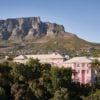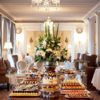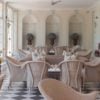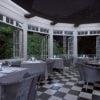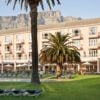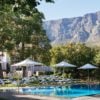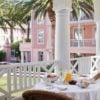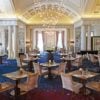The historic landmark hotel of Cape Town
Facilities & services
- 209 rooms
- Two outdoor pools
- Tennis courts
- Spa
- Fitness centre
- Golf practice net
- Two restaurants
- Bar
Activities
- Exploring the city
- The famous afternoon tea
The Grand Dame, heritage property of Cape Town, the Mount Nelson comes with bags of history and is perhaps the most famous hotel in the city. It’s set in large grounds and is made up of a number of different smaller buildings. Most rooms have been refurbished with a contemporary refresh, adding comfort and modern touches to the historic décor. The bar and restaurant have had a similar treatment making them a popular place to visit for Capetonians (a great sign for any hotel restaurant, particularly in the fickle and competitive Cape Town restaurant scene).
From their vermiculture project and on-site beehives, to their use of locally produced organic vegetables, the hotel puts a strong emphasis on having a positive impact on the environment and local community.
Rooms are very comfortable and spacious and are located in several buildings dotted throughout the large property and gardens. This makes it stand apart from other larger hotels in Cape Town as in this most outdoor of cities it’s great to have large, green gardens to take a stroll through and outdoor pools (and for the more active, there are also tennis courts).
Though The Mount Nelson is very much a location in itself, the large grounds sit just a short stroll away from downtown and also the Kloof Street Area, which is famous among locals for excellent new restaurants and boutiques. Afternoon Tea at the Nelson (or Nellie as it is affectionately known) is a Cape Town institution and well worth trying.
Earthworms saving the world
The Mount Nelson was the first luxury hotel in South Africa to practice ‘vermiculture’. A custom-designed worm farm was established on the hotel property to manage the disposal of much of the hotel’s organic waste. A special breed of earthworm processes leftover organic waste and the end-product – ‘vermicast’ or ‘worm tea’ – is rich in nutrients and is used as fertiliser and soil conditioner for the hotel’s magnificent gardens.
All things local
Chef Rudi buys organic vegetables from township community farmers, ensuring local entrepreneurs are supported. He also sources his herbs from a neighbouring organic farm and ensures all unused fruit skins are sent to the Spier pig farm so nothing goes to waste. The hotel also purchases 80% of stock for the on-site boutique from small local crafters, traders and various community projects.
Bees and art
The hotel has set up three beehives, not only to harvest honey for their guests but also to support the survival of the Cape Honeybee. These bees are important pollinators of plants and this particular subspecies is under threat. They have also created a unique art exhibit – a triptych of illustrations crafted from dead bees, which highlights their endangered status.
Plan your trip to
Africa
Whatever you want from your adventure in the Africa, our team of expert travel designers are ready to help.


















